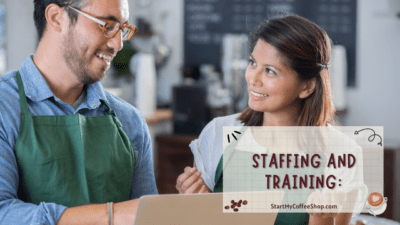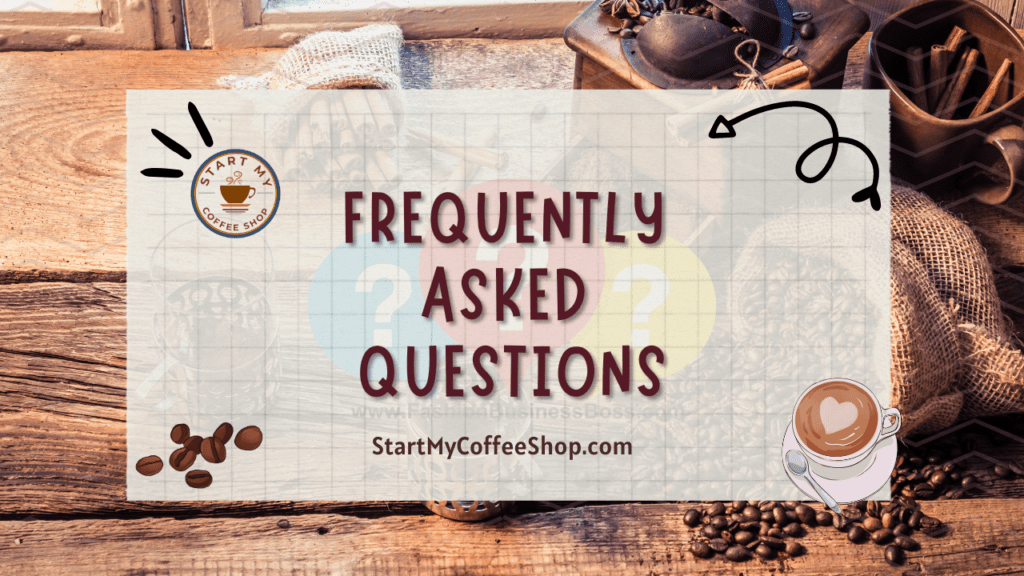Are you passionate about coffee and dreaming of opening your coffee shop? It’s an exciting venture, but before you dive in, it’s crucial to understand the costs involved in starting a coffee shop. From securing a location to purchasing equipment and hiring staff, these expenses can add up quickly.
Starting a coffee shop involves various costs like location, equipment, licenses, marketing and budgeting. Plan carefully, consider market research, and account for staffing, inventory, and operational expenses. With proper planning, you can turn your coffee shop dream into a great reality.
In this article, I will explore the various costs associated with opening a coffee shop.
1. Market Research and Planning:
Before venturing into the world of opening a coffee shop, it is crucial to conduct comprehensive market research. This step plays a vital role in setting the foundation for your business’s progress. By investing time and effort in market research, you can gain valuable insights that will help shape your coffee shop’s direction.
Thorough market research allows you to identify your target audience. Understanding the demographics, preferences, and needs of your potential customers will enable you to tailor your offerings to their tastes. Moreover, it will help you determine the ideal location for your coffee shop, considering factors such as foot traffic and proximity to your target market.
Analyzing your competitors is another significant aspect of market research. Studying existing coffee shops in your area will provide valuable insights into their strengths, weaknesses, and unique selling points. This knowledge will allow you to differentiate your coffee shop and develop strategies to attract customers.
Assessing the demand for specialty coffee in your area is essential. Determine if there is a growing market for specialty coffee or if there is an untapped niche that you can fill. Understanding the demand will help you position your coffee shop and develop a menu that appeals to the preferences of your potential customers.
Additionally, creating a solid business plan is crucial. A well-crafted business plan acts as a roadmap for your coffee shop’s improvement. It outlines your vision, goals, target market, marketing strategies, financial projections, and more. With a comprehensive business plan, you can estimate costs accurately, secure funding if needed, and make informed decisions as you navigate the challenges of starting a coffee shop.
2. Location:
When it comes to starting a coffee shop, finding the perfect location is paramount to attracting customers and ensuring profitability. The right location can make or break your business. The cost of securing a prime location will depend on various factors, including the city, neighborhood, and size of the space.
Lease or purchase costs will be a significant consideration. Leasing a commercial space typically involves monthly rent payments, while purchasing a property may require a larger upfront investment. Take into account the financial implications of each option and choose the one that aligns with your long-term goals and budget.
In addition to the financial aspects, consider any necessary renovations or remodeling expenses. The space may need modifications to accommodate your coffee shop’s layout, equipment, and aesthetic. These costs can vary depending on the condition of the space and the extent of the changes required. Factor in these expenses when calculating your overall budget.
When selecting a location, also consider factors such as foot traffic, accessibility, visibility, and proximity to your target market. A bustling area with high foot traffic can attract more customers, but it may come with higher costs. Assess the potential customer base in the area and evaluate if it aligns with your coffee shop’s concept and offerings.
3. Licensing and Permits:
When starting a coffee shop, it is essential to navigate the legal and regulatory landscape. Operating a coffee shop requires obtaining the necessary licenses and permits to ensure compliance with health and safety standards. The specific permits and certifications you will need may vary depending on your location and local regulations.
Health permits are typically required to ensure that your coffee shop meets sanitation and hygiene standards. These permits often involve inspections by health authorities to ensure that your establishment maintains a clean and safe environment for food preparation and service.

Business licenses are another crucial requirement. These licenses authorize you to operate a business in your specific location and comply with local regulations. The costs associated with obtaining a business license can vary based on factors such as your city, state, and business structure.
In addition to health permits and business licenses, you may also need food handling certifications. These certifications demonstrate that you and your staff have received proper training in handling and preparing food safely.
The costs associated with licenses and permits can vary depending on your location and the specific requirements set by local authorities. It is advisable to research the licensing process in your area and budget accordingly for application fees, renewal fees, and any required inspections.
Failure to obtain the necessary licenses and permits can result in fines, penalties, or even closure of your coffee shop. Therefore, it is essential to thoroughly understand and fulfill all legal obligations to ensure the smooth and lawful operation of your business.
Read more about Cost to Start Dunkin’s Coffee Shop: Analyzing the Cost Factors
4. Equipment and Furnishings:
When starting a coffee shop, investing in high-quality equipment is paramount for its smooth operation. Consider the expenses associated with essential equipment such as espresso machines, grinders, brewers, refrigerators, blenders, and other appliances crucial to your coffee-making process. Opting for reliable and durable equipment may require a significant upfront investment but can contribute to long-term efficiency and customer satisfaction.
In addition to coffee-making equipment, don’t overlook the costs of furnishing your coffee shop. The furniture you choose, including tables, chairs, counters, and decorative elements, plays a vital role in creating a welcoming ambiance for your customers. Balancing aesthetics, comfort, and durability is crucial when selecting furniture items that align with your coffee shop’s theme and target audience.
Consider your desired capacity and the layout of your space when determining the quantity and types of equipment and furniture needed. It’s essential to strike a balance between functionality, space optimization, and customer comfort.
When budgeting for equipment and furnishings, research reputable suppliers and compare prices to ensure you are getting the best value for your investment. Keep in mind that cheaper options may result in lower quality or frequent maintenance needs, impacting the efficiency and longevity of your coffee shop.
Moreover, consider the ongoing costs associated with equipment maintenance, repairs, and replacements. Regular maintenance and servicing of coffee machines and other appliances are necessary to keep them in optimal condition and avoid any disruptions in your daily operations.
5. Inventory and Supplies:
To provide your customers with a delightful coffee experience, it is crucial to stock up on high-quality ingredients. This includes sourcing premium coffee beans, a range of syrups, milk options, teas, and other essential ingredients needed to craft a diverse beverage menu. The cost of these ingredients will depend on factors such as quality, brand, and quantity.
In addition to the core ingredients, it is important not to overlook the expenses associated with necessary supplies. Disposable cups, lids, stirrers, napkins, and other items are essential for serving and maintaining cleanliness in your coffee shop. Calculating the cost of these supplies and factoring them into your budget is crucial for smooth operations and meeting customer expectations.
Maintaining an adequate inventory is vital to ensure you can meet customer demand without running out of key ingredients or supplies. Conducting regular inventory checks and adjusting your purchasing patterns accordingly will help you strike the right balance. Overstocking can lead to unnecessary expenses and potential wastage while understocking can result in dissatisfied customers and lost sales.
Consider establishing relationships with trusted suppliers who can provide consistent quality and competitive pricing for your ingredients and supplies. This can help streamline your procurement process and potentially negotiate better deals as your coffee shop grows.
Moreover, stay updated with industry trends and customer preferences to diversify your beverage offerings and keep up with evolving tastes. Experimenting with new flavors and seasonal specials can attract customers and create a sense of excitement around your menu.
6. Staffing and Training:
When planning your budget, it is crucial to consider the costs associated with hiring, training, and compensating your employees. This includes baristas who masterfully craft delicious beverages, cashiers who handle transactions smoothly, and kitchen staff who prepare delectable treats.
Factor in the wages and benefits you plan to offer your employees, ensuring they align with industry standards and local labor laws. Competitive compensation packages can attract and retain skilled and motivated staff members who are dedicated to providing excellent customer service.

Investing in comprehensive training programs is also essential. Properly trained employees contribute to the consistency and quality of your coffee shop’s offerings. Allocate funds for training initiatives that cover barista skills, customer service, food safety, and any other areas relevant to your specific operations.
Additionally, consider other costs related to your employees, such as uniforms, equipment, and ongoing professional development opportunities. Providing a positive work environment, fostering a sense of teamwork, and recognizing employee contributions can also contribute to staff satisfaction and retention.
Read more about Cost To Open Coffee Ice Cream Shop: From Investment to Indulgence
7. Marketing and Advertising:
Consider investing in creating a professional website that showcases your coffee shop’s offerings, location, and unique ambiance. A well-designed website can serve as a virtual storefront and provide essential information to potential customers.
Designing a logo that represents your brand and captures the essence of your coffee shop is another important aspect. Your logo will be the visual identity that customers associate with your business, so it should be eye-catching, memorable, and reflective of your coffee shop’s personality.
Printing business cards and flyers can be an effective way to spread the word about your coffee shop. Distribute them to local businesses, community centers, and other relevant locations where your target audience can easily access them.
Utilizing online and social media platforms is crucial in today’s digital age. Establish a strong online presence by creating profiles on popular platforms like Facebook, Instagram, and Twitter. Regularly post engaging content, share updates, and interact with your followers to build brand awareness and engage with potential customers.
Consider partnering with local influencers or hosting events to generate buzz and attract attention to your coffee shop. Collaborating with influencers who have a strong following in your area can help expose your brand to a wider audience. Hosting events such as tastings, workshops, or live music performances can also create a sense of community and excitement around your coffee shop.
8. Utilities and Operational Expenses:
When running a coffee shop, it’s important not to overlook the ongoing operational costs that are necessary for its smooth functioning. These costs include utilities such as electricity, water, gas, and internet services. Reliable and efficient utilities are essential to power your coffee-making equipment, keep the lights on, maintain a comfortable environment, and ensure a seamless customer experience.
In addition to utilities, there are other recurring expenses to consider. Insurance coverage is crucial to protect your coffee shop from potential risks and liabilities. This may include general liability insurance, property insurance, workers’ compensation insurance, and others, depending on your specific needs.
License renewal fees should also be factored in. These licenses and permits are essential to maintaining your coffee shop’s legal compliance and enable you to continue operating your business smoothly. Be aware of the renewal timelines and associated costs to ensure that your licenses are up to date.
Accounting services can provide valuable assistance in managing your financial records, tax obligations, and payroll. Hiring professional accountants or utilizing accounting software can help you stay organized and ensure accurate financial reporting.
Moreover, investing in a reliable point-of-sale (POS) system is essential for efficient transactions, inventory management, and tracking sales. Consider the upfront costs of acquiring the POS hardware and software, as well as any ongoing maintenance or subscription fees.
Summary
By considering all the costs involved, from location and equipment to staffing and marketing, you’ll be well-prepared to navigate the financial aspects of starting your coffee shop. Remember to conduct thorough research, create a comprehensive business plan, and regularly review and adjust your budget as needed. With a strategic approach and a passion for coffee, you can turn your dream of owning a great coffee shop into a reality.
Frequently Asked Questions

Question: What are the ongoing operational expenses for a coffee shop?
Answer: Operational expenses for a coffee shop include utilities (electricity, water, gas), supplies (coffee beans, milk, cups, etc.), wages for staff, marketing and advertising costs, insurance, license renewal, and point-of-sale systems.
Question: Do I need any specific licenses or permits to open a coffee shop?
Yes, operating a coffee shop typically requires obtaining licenses and permits such as health permits, business licenses, and food handling certifications.
Question: How much should I budget for coffee shop equipment?
On average, you can expect to spend between $10,000 to $40,000 or more for quality equipment.
To learn more on how to start your own coffee shop checkout my startup documents here
Please note: This blog post is for educational purposes only and does not constitute legal advice. Please consult a legal expert to address your specific needs.

Hi! I’m Shawn Chun
My adventure in coffee began when I first launched my first coffee shop back in the early 2000s. I had to figure out so many things on my own and to make it worse within 2 years of opening two large corporate coffee chains moved in just blocks away from me!
As I saw smaller and even some larger coffee shops in the neighborhood slowly lose customers to these giant coffee chains and slowly close up shop, I knew that I had to start getting creative…or go out of business.
I (like you may be) knew the coffee industry well. I could make the best latte art around and the foam on my caps was the fluffiest you have ever seen. I even had the best state-of-the-art 2 group digital Nuova Simonelli machine money could buy. But I knew that these things alone would not be enough to lure customers away from the name brand established coffee shops.
Eventually, through lots of trial and error as well as perseverance and creativity I did find a way to not only survive but also thrive in the coffee/espresso industry even while those corporate coffee chains stayed put. During those years I learned to adapt and always faced new challenges. It was not always easy, however, in the end, I was the sole survivor independent coffee shop within a 10-mile radius of my location. Just two corporate coffee chains and I were left after that year. All told the corporate coffee chains took down over 15 small independent coffee shops and kiosks and I was the last one standing and thriving.
Along the years I meet others with the same passion for coffee and I quickly learned that it is not only “how good a barista is” that makes a coffee shop successful, but the business side of coffee as well.
Hence why I started this website you are on now. To provide the tools and resources for up and coming coffee shop owners to gain that vital insight and knowledge on how to start a coffee shop successfully.
Stick around, browse through my helpful blog and resources and enjoy your stay! With lots of LATTE LOVE!
Shawn







